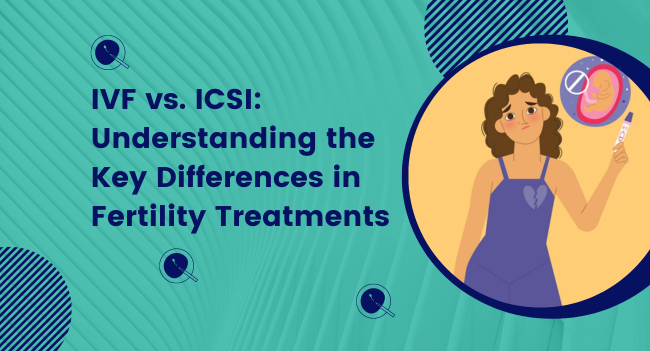
ICSI vs IVF – Dreaming of building a family, but traditional methods just aren’t working? IVF and ICSI might be the fertility superheroes you need!
Both methods have their own distinct flair and specialized application, transforming the quest for parenthood into a scientific voyage. Whether you’re on this journey yourself or simply intrigued by reproductive marvels, grasping the core differences between IVF and ICSI treatment will unlock the mysteries behind these cutting-edge procedures.
Here, in this article we will give an overview of IVF vs ICSI in a way that’s easy to understand and helps you having a detailed discussion with our fertility specialist to choose a path that’s best for you.
In Vitro Fertilization, or IVF treatment, is a type of assisted reproductive technology (ART) where eggs are extracted and fertilized by sperm outside the body. This process involves placing the eggs and sperm in a laboratory dish, allowing the sperm to move toward and fertilize the eggs naturally. Post fertilization, the resulting embryos are then cultured in an incubator for three to five days. The most viable embryos are then selected by doctors for transfer back into the uterus.
Intra-Cytoplasmic Sperm Injection or ICSI treatment, is a variation of IVF where a single sperm is directly injected into an egg, bypassing the natural fertilization process. This technique is particularly recommended for treating male-factor infertility.
The primary distinction between IVF and IVF combined with ICSI lies in the fertilization process. In traditional IVF, eggs and sperm are placed together in a petri dish, allowing fertilization to occur naturally as sperm attempt to penetrate the eggs.
In contrast, the ICSI method involves directly injecting a single selected sperm into an egg. This manual process reduces risks such as fertilization by multiple sperm or the failure of sperm to penetrate the egg. In certain cases, embryologists achieve better results by incorporating ICSI into the IVF cycle.
Following are some of the most common benefits of ICSI treatment:
ICSI Targets Male-Specific Challenges: This specialized procedure tackles infertility issues stemming primarily from the male partner.
It’s particularly well-suited when sperm face hurdles in fertilizing the egg, such as:
ICSI: A Popular and Effective Choice: Doctors often recommend ICSI for situations involving frozen eggs or sperm, eggs retrieved from women over 35, or when previous IVF attempts using conventional methods haven’t resulted in fertilization. In fact, ICSI is now used in roughly 60% of all ART procedures, boasting a high success rate of fertilization between 50% and 80%.
Following are some of the most common benefits of IVF treatment:
Studies reveal that ICSI achieves fertilization in 70-80% of eggs, compared to a 50-60% range with conventional IVF treatment. However, when it comes to implantation and live birth rates, both procedures hold similar promise, especially when male infertility isn’t a factor.
Both IVF and ICSI involve collecting eggs and sperm from each partner or a donor. On the day of egg retrieval, an embryologist inseminates the eggs. The following day, fertilized eggs are identified and then monitored in an incubator for up to five days. The best embryos are selected and transferred into the uterus to implant.
ICSI treatment might be the better option if sperm-related infertility is an issue, as it is the most effective treatment for male infertility. This method involves directly injecting sperm into the egg, offering additional assistance for successful fertilization.
Our doctor may recommend ICSI if the male partner has:
IVF is a widely used and highly successful fertility treatment suitable for various fertility issues and demographics. There are different types of IVF tailored for different ages and conditions.
Schedule an elaborate discussion with our fertility specialist, Dr. Partha Das.

Dr Partha Das is a highly skilled fertility/IVF Physician specializing in Reproductive Endocrinology and Infertility. Dr Partha consults and manages patients presenting with complex gynecological, male and female infertility issues and management of recurrent miscarriage and IVF failures.